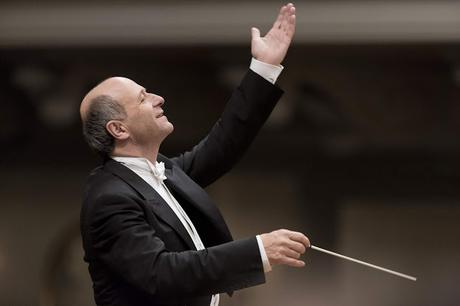by Paul J. Pelkonen

Iván Fischer has led the Budapest Festival Orchestra since founding it in 1983.
Photo by Marco Borggreve.
The first program was Friday night, and opened with a Bartók staple: the Suite from his ballet The Miraculous Mandarin. Under the baton of Iván Fischer, this familiar work had bold and shattering power. The Mandarin is a sordid story, of a young prostitute and the two thugs who avail themselves of her clients' material goods. Here, the big brassy chords and skittering strings evoked the tawdry atmosphere of her bed-sit, and the spooky effects in the score (the Mandarin, her third client, refuses to succumb to death) made the hair stand on end.
What followed was also Bartók but of great contrast. Mr. Fischer took the microphone and explained to the audience how the composer, along with his countryman and colleague Zoltán Kodály, was instrumental in setting up a music education system that is still used in Hungary today. Then he introduced the young ladies of the Cantemus Choir and their leader Dénes Szabó, who looked thrilled and a bit shocked to be setting foot on the famous podium on the Perelman Stage.
These short choral works are fascinating, and thirteen of them were presented in short order. The first six were done a capella, with the text in Hungarian, a language that is a mystery to these ears. One sensed however, the dedication of these singers, and the joy that they had in presenting these Bartók rarities. Mr. Fischer took over direction for the next seven songs, having the strings of his orchestra provide supple and sinewy support.
The second half of Friday's concert featured the Concerto for Orchestra, Bartók's final complete masterpiece. Commissioned by the Boston Symphony Orchestra, this is the musical and spiritual reverse of the earlier Mandarin. These five movements are all light and orchestral virtuosity, as the players get involved in the giant mechanical game that makes sure that each of them (or at least section) is allowed to lift its solo voice. The most enthusiastic moments came in the quirky bassoon solos, the sad sighing of the massed violas and the guttural, slightly debauched roar of the heavy brass.
Friday's concert ended with a short encore: a set of Romanian folk dances played by a mustachioed violinist, a violist double bassist. These three fellows were actually giving a short preview of the following evening: as it would be they who would open Saturday's concert. Their toe-tapping virtuosity was then followed by Bartók's own orchestral arrangement of the same dances, at turns mournful, ebullient and enthralling. Mr. Fischer then invited folk singer Márta Sebestyén for a set of Hungarian peasant songs. She was accompanied by the aforementioned string trio. Then Bartók's own settings of Hungarian songs were performed with Ms. Sebestyén singing and dancing in front of the full orchestra.
As with Friday night, what followed could not have been more different. This was Duke Bluebeard's Castle, the composer's only opera. A single act, lasting one hour, it is the story of Bluebeard (the dark-voiced bass Krisztián Cser) and his wife Judith (the powerful mezzo Ildikó Komlósi) newly arrived at their terrifying marital home. The opera is a deep exploration of the power struggle in any marriage, and the dangers of exposing the secrets that a new spouse who happens to be a homicidal maniac may want to keep from his wife.
In the opening, the orchestra depicts the darkness and gloom and Judith's request that Bluebeard let her unlock the seven mysterious doors that contain his secrets, his treasures and finally, his first three wives. There are glorious moments of orchestral portrayal: the lush major-key warblings of Bluebeard's gardens, the overwhelming in-your-face brass as the Fifth Door is unlocked revealing his kingdom, and the slithering, watery chords that Bartók uses to depict the lake of tears behind the Sixth Door. The finale is a dark apotheosis, in which the major ideas of the Fifth Door are re-presented in stentorian, stark minor keys. Free of the interference of director and stage set, the horror of this story came across with profound and punishing force, and the singers threw their instruments into their roles with increasing abandon.
If you enjoyed this article, it's time to click over to Superconductor's Patreon page, and help support the cost of independent music journalism in New York City at the low cost of just $5/month.

